Phil Cox - A tribute

In the late summer of 1975 I met an extraordinary person. His name was Philip Cox - and this is a small tribute to acknowledge just some of the courageous and meaningful things he achieved during his relatively short life.
Although Phil was certainly not an English version of Harvey Milk (mainly because of his disdain for organised politics), he certainly was a significant socio-political activist for young gay people in London during the 1970’s and 80’s. He was someone whose actions, in the broader social context of Gay liberation, meant something. He co-formed the first London Gay Teenage Group (LGTG) with his then flat-mate Paul at their council flat high up in a tower block in Bath Street, EC1. The group advertised its presence and activities through Gay News and also Gay Switchboard, with whom Phil was a lifelong contributor. I remember turning up to the LGTG for the first time to hear a talk about “Rubber”. It makes me laugh to think that in my complete naiveté I actually expected to learn stuff about plantations in Malaysia! I had been racking my brains trying to figure out what on earth that had to do with being a gay teenager. The primary aim of the Group was to give young Gay people the chance to meet up in a safe environment to socialise and relax in, as well as to discuss how to try and get things changed for the better. It has to be remembered that back then it was still a risky business for young gays to meet at Gay pubs and clubs. The ‘age of consent’ was still 21 and with ignorance, prejudice and homophobia rife everywhere, it could be a risky business meeting people of one’s own kind - even in a big city like London. I was never very certain as to the legality of the Group - we were all under the age of consent and there were no members over the age of 21 to be accused of corrupting us. This collective was organised and run by young people for young people - and for many it was a literal lifeline of contact.
But back to my first encounter with Phil: I had, rather nervously, arrived at that first meeting to find about 6 or 7 other people already there. Not content with just a few drinks and snacks to welcome these guests, Phil and Paul had prepared not just mountains of Garlic Bread (a rare culinary delicacy that had not graced dinner tables where I came from) but also gallons of a rather bizarre vegetarian stew. I say bizarre because although the guests could easily identify most of the vegetarian ingredients, the one thing none of us could quite fathom was the vast amount of small clove shaped white objects that the thing was filled with. It was with some horror that we finally realised that these weird lumps were actually whole garlic cloves! Fearing for the levels of atmospheric pollution that would ensue if we had actually devoured these, in addition to the copious amounts of garlic bread, much of the concoction was politely left uneaten. The actual content of the meeting is now lost in the mists of my memory. It doesn’t really matter either, the point was that for the first time in my life I was with people who knew exactly where I was coming from, my own kind, and it was an experience I will never forget. Phil’s somewhat intense nature fascinated me in deference to Paul’s rather strange aloofness and detachment. It quickly became obvious that Phil shared my sense of humour and my fascination with electronics and gadgetry. At the end of that first evening I had to get back to Charing Cross to catch the last train home to Tunbridge Wells. Phil had that sorted as well - of course! He persuaded me to hitch a lift on the back of a motorbike driven by a really kind Irish guy who had been there for the evening with us. I recall worrying that we didn’t have enough time to get from Old Street to Charing Cross; I needn’t have worried - the bike practically flew round the inner London streets with me clinging on for dear life on the back. I never saw or heard from this guy again. I guess I must either have been a lousy passenger, or perhaps my garlic breath had painfully scorched the back of his neck.
That episode was my first taste of Phil’s
extraordinary organisational abilities. Over the
months and years that followed he would never
cease to amaze me with his enthusiasm, fervour
and passion for agitprop politics. If a pub got
raided by the Police he would phone everyone
he knew and urge them to support the cause by
turning up on some reactionary demo march.
I particularly recall the news of Harvey Milk’s
death and of the ensuing Stonewall riots in
New York.
Of course the Police regularly raided our pubs and clubs in British cities too, and there had been trouble brewing in Earl’s Court at the Coleherne and at a cellar bar/club in Brighton (the name of which escapes me now). Phil always thought it was important that gay people fought back against oppression and bigotry, although he was a pacifist and abhorred violence of any kind. He, like many of us, felt that the best way to fight the oppression of the time was to firstly ‘come out’ and make ourselves visible wherever we could, to behave in exactly the way we wanted to do (especially to be able to freely express our emotions in the way that everyone else in society did), and to enjoy being who we were in as supportive a way as possible. It was very much a case of young Gay people doing it for themselves - everything from fashion and music (our friends Paul and Steve being some of the earliest Punks I ever saw - it having been a Gay fashion craze long before it went mainstream).
One of Phil’s other great passions was pirate radio. The established broadcasting media had no interest or obligation to provide a platform for minorities, and this was all about 20 years before the internet would make such a facility available to all. Therefore the various pirate radio stations provided an outlet to broadcast - albeit a rather risky and unreliable one.
Phil had discovered ‘Our Radio’, a London based pirate radio station set up to provide community services that the mainstream broadcasters weren’t covering. The Home Office of course couldn’t allow people to do things for themselves and there was always something of a cat and mouse chase going on between the pirates and the killjoy no fun brigade who would raid and confiscate any equipment they could find. Phil’s flat was very high up in his tower block and he had an open balcony (see picture below). This was a perfect location to erect ersatz aerials that would be difficult to spot form the ground and easy to dismantle and hide should the Home Office bullies sniff the location out. Amusingly Phil managed to hide a rather large aerial amongst his washing; hardly Crystal Palace, but it certainly did a good job!
I have no idea how Phil either found Our Radio or managed to persuade them to let us broadcast what I understand was the first ever dedicated gay radio programme, which we called ‘Gaywaves’. Phil and I spent hours and hours recording jingles and articles for this little bit of minor broadcasting activism. Gaywaves was recorded and edited on tape and then broadcast by Our Radio every Wednesday night from the 5th May 1982. The programmes were rough and crude by professional standards, but in a strange way they achieved their objective to be different from the status quo. Listening to them now they still manage to retain genuine passion and interest and in many ways they're as fresh today as they were when we made them over 35 years ago. Through these broadcasts more contacts were made and young gay people all over London discovered that they were no longer alone. Credit is due to the people of Our Radio who were so incredibly supportive the Gaywaves programme.
It is wonderful that Phil’s entire collection of recordings were gifted to the British Library for posterity. Amongst the collection are tapes of whole Gaywaves Radio shows, some recordings of live broadcast parties in Phil’s flat for another pirate radio station of the time called Thameside Radio, and a lot of comedy sketches I had written and performed for broadcast on BBC Radio London (funnily enough). In the early 1980’s I was doing a guest spot on a late night show there with broadcaster Malcolm Laycock, in which I managed to slip in an item called ‘2 minutes and 30 second Theatre’ - a series of spoofs on famous films and shows. Upon further research I was moved to discover that Phil had, amongst his meticulous logging of details, credited me personally with the copyright of my own material. The Phil Cox Sound Archive can be accessed at the British Library - the following web link will take you directly to the archive page for further details:
http://www.bl.uk/reshelp/findhelprestype/sound/ohist/ohcoll/ohsex/sexuality.html
Apart from all that . . . . I was also getting up to mischief by attempting to sabotage the menus given to passengers on Fred Olsen Line tours in Scandinavia. Phil had managed to get work with this company doing something or other (I never did discover exactly what it was). He found my humorous musings hysterically funny - and we would often spend whole evenings just laughing at what consequences my rather Ortonesque attempts might be doing. I used to mock up the menus using official letter-headed paper that Phil would purloin from their offices and then he would try and infiltrate their company systems to get them included on official print runs. Quite what Norwegian cruise passengers would have made of ‘Dishcloth Lyonnaise’, ‘Moules Rita Fairclough’ and ‘Dog Mess Fritters’ is anyone’s guess. I don’t think he was sacked from that particular employ, so I guess nobody ever found out.
Meantime, Phil stuck it out in his Old Street flat, even though it was frequently vandalised and he suffered from some really terrible homophobic abuse from children and adults. These attacks never deterred him from being a really wonderful neighbour to so many. When the urine fragranced lifts broke down (which they frequently did) he would think nothing of lugging shopping for those unable to manage up the 30 or so flights of stairs it took to reach his floor.
Phil was responsible for introducing me to some of my closest friends - many of whom I have now known for over 30 years. He was a tireless supporter of , amongst many more, Gay Switchboard, London Friend and the CHE. I also fondly recall going on my first ever Gay Pride march in London with him in the long hot summer of 1976. He was a man who fought tirelessly not just for for gay rights, but also for the anti-nazi league, for peace and for the anti-nuclear power movement. The dark days that followed Margaret Thatcher’s election in 1979 only galvanised Phil’s resolve to make sure that just causes were not buried and trampled on by the ignorance and prejudice which was such a hallmark of British politics of the time.
Having eulogised about Phil to no small degree, it’s worth also recalling some of the . . . err . . . other things that made him such a colourful character - passion often comes at a price!
He had a legendary temper, and could fly
off into frightening rages if something got to him.
He was always the first to say he was
sorry though, and was inevitably capable
of truly heartwarming brotherly love and
affection.
He would often lend people money even
though he had little of his own. He would also
put people up at the flat if they were ever in
some sort of trouble, and he would always
be there for anyone that needed a shoulder
to lean on or an ear to listen.
Sadly, I lost touch with Phil in the early 1990’s - just about the time I left London to go and work in France and then the Far East. It was with great sadness, soon after I returned to London in the late 1990’s, that I learned that Phil had died during the time I had been away. I now know, thanks to details provided by the Sound Archive at The British Library, that Phil passed away on September 4th 1992. It distresses me still that I didn’t know and wasn’t able to have been there for him. Phil hadn’t been mentioned in many official or published histories of the gay rights movement in London until this page appeared in 2009 and subsequently my autobiography published in 2019, which tells a small part of his story and finally puts his name and achievements on permanent record. His dedicated work and passion for justice and liberty may well otherwise have been lost to time along with the memories of those who knew him. I will continue to do all I can to keep his name and work alive.
Apart from all of that, he was my friend and I loved him dearly. He’d have loved the sheer scope and scale of the internet and what it can do to spread ‘the word’. And now he’s a part of it - not as much as I feel he deserves, granted - but nevertheless it’s now recorded for posterity. And that’s just as it should be.
Gary
March 2009
(updated August 2020)

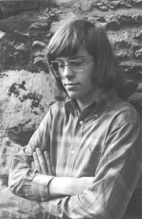
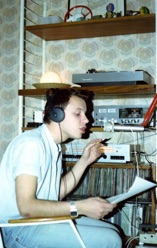
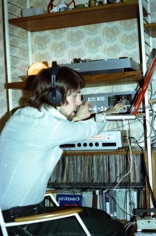
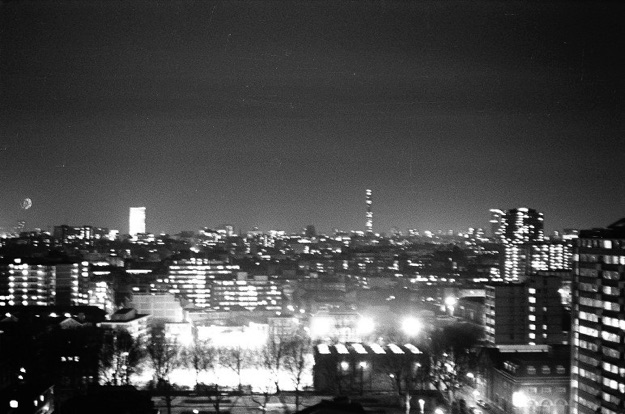
Phil at the controls during one of our many recording sessions at his bath street flat.
Christ knows where he got all that equipment from - but it was like the BBC in there!
The picture below shows me recording jingles for the ‘Gaywaves’ radio show.
I love this picture. It was taken from the open balcony of Phil’s flat. In the distance you can see the Post Office Tower, with Centre Point brightly lit on the horizon on the left hand side. It was from this balcony that the pirate radio broadcasting aerials were rigged up amongst Phil’s washing paraphernalia!
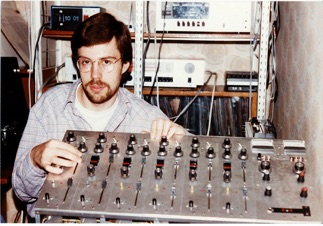
Phil preparing for a recording session with yet more of his home built electronic wizardry.

Most of the recordings we made together were put onto reel to reel tape and then edited by hand. His collection of recorded tapes is now held in an archive at the British Library in London. Details of how to access this can found at the bottom of this article.
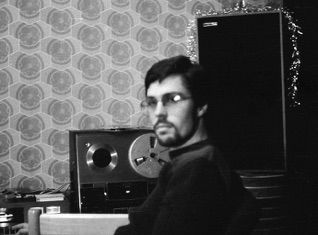

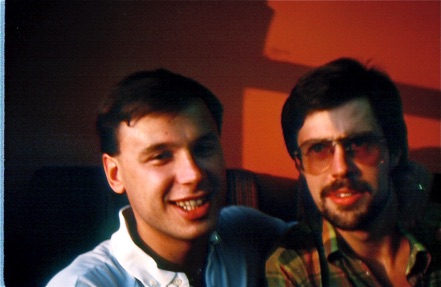
I think it’s also true to say that Phil knew almost no fear at all, and this could be a little disarming if you weren’t prepared for it. Even a simple day trip to the coast could still end up being political in some way if Phil was with you. The photograph below was staged on a beach near Broadstairs in about 1985. My then partner Michael, Phil and me had gone for a paddle and a picnic by the sea. Within minutes Phil had found a lump of chalk and had written, in large letters, a message on the wall behind our encampment. I remember thinking that we were sure to be beaten up at any minute by local yobbos, but Phil was oblivious to such dangers. Still, what the hell? It might have been risky - but it was fun!
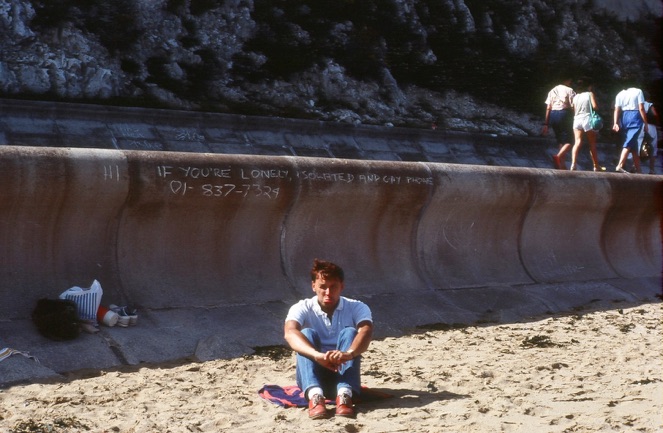
On the beach at Broadstairs - Phil having made sure that our visit was marked with an important message for the locals

Click on the file above to hear one of my original jingles for the Gaywaves programme - recorded circa 1980 in Phil’s Old Street flat.
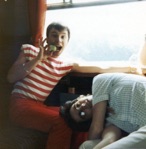
Click on the file above to hear part 1 of a travel report Phil and I recorded for the Gaywaves show.